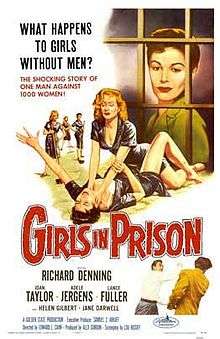Girls in Prison
| Girls in Prison | |
|---|---|
 Theatrical release poster by Albert Kallis | |
| Directed by | Edward L. Cahn |
| Produced by | Alex Gordon |
| Written by | Lou Rusoff |
| Starring |
Richard Denning Joan Taylor Mae Marsh Adele Jergens Helen Gilbert |
| Music by | Ronald Stein |
| Cinematography | Frederick E. West |
| Edited by | Ronald Sinclair |
| Distributed by | American International Pictures |
Release date |
|
Running time | 87 min |
| Country | United States |
| Language | English |
Girls in Prison is a 1956 drama/sexploitation women in prison film about a young woman who is convicted of being an accomplice to a bank robbery and is sent to an all-female prison. The film was directed by Edward L. Cahn, and stars Richard Denning, Joan Taylor, and Mae Marsh. American International Pictures released the film as a double feature with Hot Rod Girl.[1]
Plot
Anne Carson (Joan Taylor) is sent to a women's prison for allegedly participating in a bank robbery with two others, one, Paul Anderson (Lance Fuller) who is still at large. The money was never recovered and all eyes are on Anne who denies knowing about the money.
On arrival in prison, Anne meets the outwardly tough matron in charge (Jane Darwell) and the prison chaplain Rev Fulton (Richard Denning) who feels Anne may have had a mistrial and does not belong in prison. Anne's cellmates are Jenny (Adele Jergens) who seems to run the inmates, Melanee (Helen Gilbert) who makes a play for Anne and Dorothy (Phyllis Coates) a woman who has murdered her own husband and child when he ran away with another woman who is still alive. The unhinged Dorothy believes her child is still alive and every new girl in prison is her husband's lover, Lois. Jenny and Melanee team up in the "good cop/bad cop" routine to get Anne to tell them where the money is with Melanee telling Dorothy that Anne is really Lois.
On the outside, Paul is using blackmail and threats on Anne's ex-criminal father Pop Carson (Raymond Hatton) to find the money as well as offering to split it with him 50/50.
Anne faces attempted murder by Dorothy, threats on her life from two other inmates seeking the money, and fights Melanee in a catfight that culminates in a mud puddle. When a large earthquake hits the area and demolishes the installation, Jenny (who has acquired a pistol from her outside contacts and the outwardly harmless trustee Grandma (Mae Marsh) and Melanee use the opportunity to escape with Anne to take her home to locate the money.
The downed telephone and power lines give the three girls time to escape unpursued but Rev Fulton heads off Anne at her home, where Pop is still held at gunpoint by Paul.
Since the film’s release in 1956, the theatrical movie poster, featuring a catfight between Helen Gilbert and Joan Taylor, has become a collector’s item. The poster shows the blonde haired Gilbert strangling the dark haired Taylor although that exact scene did not occur in the movie.[2]
Production
This was the first of many films that Edward L. Cahn did for AIP with producer Alex Gordon. A Production Code administrator warned Gordon that any hint of lesbianism whether in speech or manners had to be eliminated from the script, but Gordon filmed them regardless.[3] Gordon's film company Golden State Productions made the first film released by AIP, Apache Woman also starring Joan Taylor.
Denning was paid a percentage of the profits.[4]
Remake
Cinedigm produced 2015 an Adaptive Internet Protocol remake of the film.[5]
Notes
- ↑ Gary A. Smith, American International Pictures: The Golden Years, Bear Manor Media 2014 p 32
- ↑ Halperin, James L. (ed.) (2005) Heritage Vintage Movie Poster Signature Auction 2005 Catalog #624. Dallas: Heritage Capital Corporation, page 63.
- ↑ p.248 Barrios, Richard Screened Out: Playing Gay in Hollywood from Edison to Stonewall 2003 Routledge
- ↑ Drama: 'River' Producer Seeks David Wayne as Pearl King; Pat Crowley Signs Schallert, Edwin. Los Angeles Times (1923-Current File) [Los Angeles, Calif] 11 Apr 1956: 25.
- ↑ Cinedigm To Create Shared Universe From 10 AIP Remakes